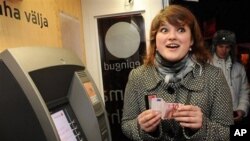The people of Estonia are adjusting to a new way of payment after their nation became the first former Soviet Union state to dump its own currency and adopt the euro on New Year's Day. Government officials have warned however that concerns over the future of the single European currency put off bigger eastern European countries from joining, for up to a decade.
Crowds in Estonia's capital Talinn have braved freezing temperatures to sing and dance - many of them near cash machines, where they curiously look at their new currency, the euro.
Tallinn has also become a 2011 European Capital of Culture.
Yet critics are still in doubt over whether dumping the country's kroon was the right move for this Baltic state of just 1.3 million people.
Kirsi Altonen, who is originally from Finland, expresses mixed emotions about the euro.
"I suppose that the prices will go up in Estonia. But it's easier of course to travel from Finland and so on. But...",
There are also skeptics in other Eastern European countries, such as Poland, the Czech Republic and Hungary.
They no longer seem in a hurry to join the club of 17 nations comprising the 'euro zone', saying they first want to see how debt problems are solved in troubled Ireland, Greece, Spain and Portugal.
Polish central bank governor Marek Belka has told local media that Poland would only join when there was "order" in the euro zone. He sees no reason to rush as, in his words, "there are dramatic things happening".
Czech Prime Minister Petr Necas says introducing the euro would not benefit his country for a long time.
Hungary's Prime Minister Viktor Orban agrees. He says Hungary's introduction of the euro may be as many as 10 years away.
Mr. Orban says he does not want to give an exact date as many euro target dates were mentioned, and missed. But the prime minister admits that in his words
the introduction of the euro in Hungary "does not seem realistic before the end of the decade."
Analysts had earlier mentioned 2016 as a realistic date for Hungary and said larger eastern nations such as Poland may not join before 2020.
Experts say several Eastern European countries fear introducing the euro would make them less competitive as it involves losing flexibility exchange rates.
The debt crisis faced by several EU member states has also undermined a popular idea that being a euro zone member guarantees easy access to cash and lower borrowing costs.
But Hungarian Foreign Minister Janos Martonyi denies that Hungary has abandoned the euro. He says the government wants to assist in helping to stabilize the euro zone during Hungary's European Union presidency, which began on New Year's Day.
"We shouldn't believe that the euro is [only] for the euro zone countries. The euro is a matter for all of us. If the euro gets weaker, if the euro is in danger, we are all in danger," said Martonyi. "And we all have to be fully aware that we know that Europe's strength, Europe's economic and political power, Europe's projection, Europe's ideas all depend upon a healthy and strong economic situation as reflected by a healthy and strong and save currency."
European Commissioner for Economic and Monetary Affairs, Olli Rehn, makes clear that the euro zone will face many challenges in the coming years.
"Last decade to the past decade was the decade of turning [the euro] into reality," he said. "And the present decade which is now starting will be the decade of the fundamental reform of the euro area, of the economic and monetary union."
Back in Talinn an elderly man, Tiit Toominte, who lived through the years when his country was part of the Soviet Union, has hopes for the euro currency. He sees the euro as key to doing business in the Baltics.
When somebody will go abroad from Estonia and will look on the prices of different products [such as] shoes [and] clothes, he says, it will be easily possible to compare the differences with Estonia. He says he hopes commerce will improve thanks to this.
If it's up to the European Commission, more Europeans will share his view.
Estonia Adjusts to Euro Amid Concerns Over Currency's Future











